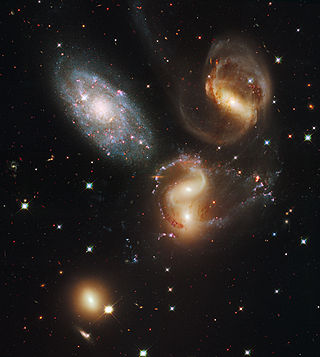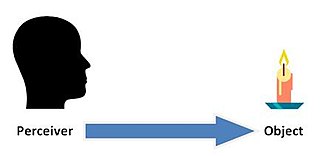Related Research Articles
In analytic philosophy, anti-realism is a position which encompasses many varieties such as metaphysical, mathematical, semantic, scientific, moral and epistemic. The term was first articulated by British philosopher Michael Dummett in an argument against a form of realism Dummett saw as 'colorless reductionism'.

In metaphysics, nominalism is the view that universals and abstract objects do not actually exist other than being merely names or labels. There are at least two main versions of nominalism. One version denies the existence of universals – things that can be instantiated or exemplified by many particular things. The other version specifically denies the existence of abstract objects – objects that do not exist in space and time.

In metaphysics, ontology is the philosophical study of being. It investigates what types of entities exist, how they are grouped into categories, and how they are related to one another on the most fundamental level. Ontologists often try to determine what the categories or highest kinds are and how they form a system of categories that encompasses the classification of all entities. Commonly proposed categories include substances, properties, relations, states of affairs, and events. These categories are characterized by fundamental ontological concepts, including particularity and universality, abstractness and concreteness, or possibility and necessity. Of special interest is the concept of ontological dependence, which determines whether the entities of a category exist on the most fundamental level. Disagreements within ontology are often about whether entities belonging to a certain category exist and, if so, how they are related to other entities.

The problem of universals is an ancient question from metaphysics that has inspired a range of philosophical topics and disputes: "Should the properties an object has in common with other objects, such as color and shape, be considered to exist beyond those objects? And if a property exists separately from objects, what is the nature of that existence?"
In metaphysics, a universal is what particular things have in common, namely characteristics or qualities. In other words, universals are repeatable or recurrent entities that can be instantiated or exemplified by many particular things. For example, suppose there are two chairs in a room, each of which is green. These two chairs share the quality of "chairness", as well as "greenness" or the quality of being green; in other words, they share two "universals". There are three major kinds of qualities or characteristics: types or kinds, properties, and relations. These are all different types of universals.

The world is the totality of entities, the whole of reality, or everything that exists. The nature of the world has been conceptualized differently in different fields. Some conceptions see the world as unique while others talk of a "plurality of worlds". Some treat the world as one simple object while others analyze the world as a complex made up of parts. In scientific cosmology, the world or universe is commonly defined as "[t]he totality of all space and time; all that is, has been, and will be". Theories of modality talk of possible worlds as complete and consistent ways how things could have been. Phenomenology, starting from the horizon of co-given objects present in the periphery of every experience, defines the world as the biggest horizon or the "horizon of all horizons". In philosophy of mind, the world is contrasted with the mind as that which is represented by the mind. Theology conceptualizes the world in relation to God, for example, as God's creation, as identical to God or as the two being interdependent. In religions, there is a tendency to downgrade the material or sensory world in favor of a spiritual world to be sought through religious practice. A comprehensive representation of the world and our place in it, as is found in religions, is known as a worldview. Cosmogony is the field that studies the origin or creation of the world while eschatology refers to the science or doctrine of the last things or of the end of the world.

Reality is the sum or aggregate of all that is real or existent within the universe, as opposed to that which is only imaginary, nonexistent or nonactual. The term is also used to refer to the ontological status of things, indicating their existence. In physical terms, reality is the totality of a system, known and unknown.
Moral relativism or ethical relativism is used to describe several philosophical positions concerned with the differences in moral judgments across different peoples and cultures. An advocate of such ideas is often referred to as a relativist for short.
Moral realism is the position that ethical sentences express propositions that refer to objective features of the world, some of which may be true to the extent that they report those features accurately. This makes moral realism a non-nihilist form of ethical cognitivism with an ontological orientation, standing in opposition to all forms of moral anti-realism and moral skepticism, including ethical subjectivism, error theory, and non-cognitivism. Within moral realism, the two main subdivisions are ethical naturalism and ethical non-naturalism.
Scientific realism is the view that the universe described by science is real regardless of how it may be interpreted. A believer of scientific realism takes the universe as described by science to be true, because of their assertion that science can be used to find the truth about both the physical and metaphysical in the Universe.
Ethical subjectivism is the meta-ethical view which claims that:
- Ethical sentences express propositions.
- Some such propositions are true.
- The truth or falsity of such propositions is ineliminably dependent on the attitudes of people.
In metaphysics and philosophy of language, the correspondence theory of truth states that the truth or falsity of a statement is determined only by how it relates to the world and whether it accurately describes that world.
In logic and philosophy, a property is a characteristic of an object; a red object is said to have the property of redness. The property may be considered a form of object in its own right, able to possess other properties. A property, however, differs from individual objects in that it may be instantiated, and often in more than one object. It differs from the logical/mathematical concept of class by not having any concept of extensionality, and from the philosophical concept of class in that a property is considered to be distinct from the objects which possess it. Understanding how different individual entities can in some sense have some of the same properties is the basis of the problem of universals.

In philosophy of perception and epistemology, naïve realism is the idea that the senses provide us with direct awareness of objects as they really are. When referred to as direct realism, naïve realism is often contrasted with indirect realism.
A possible world is a complete and consistent way the world is or could have been. Possible worlds are widely used as a formal device in logic, philosophy, and linguistics in order to provide a semantics for intensional and modal logic. Their metaphysical status has been a subject of controversy in philosophy, with modal realists such as David Lewis arguing that they are literally existing alternate realities, and others such as Robert Stalnaker arguing that they are not.
Philosophical realism – usually not treated as a position of its own but as a stance towards other subject matters – is the view that a certain kind of thing has mind-independent existence, i.e. that it exists even in the absence of any mind perceiving it or that its existence is not just a mere appearance in the eye of the beholder. This includes a number of positions within epistemology and metaphysics which express that a given thing instead exists independently of knowledge, thought, or understanding. This can apply to items such as the physical world, the past and future, other minds, and the self, though may also apply less directly to things such as universals, mathematical truths, moral truths, and thought itself. However, realism may also include various positions which instead reject metaphysical treatments of reality entirely.

Moderate realism is a position in the debate on the metaphysics of universals associated with the hylomorphic substance theory of Aristotle. There is no separate realm in which universals exist, nor do they really exist within particulars as universals, but rather universals really exist within particulars as particularised, and multiplied.

Quietism in philosophy sees the role of philosophy as broadly therapeutic or remedial. Quietist philosophers believe that philosophy has no positive thesis to contribute, but rather that its value is in defusing confusions in the linguistic and conceptual frameworks of other subjects, including non-quietist philosophy. For quietists, advancing knowledge or settling debates is not the job of philosophy, rather philosophy should liberate the mind by diagnosing confusing concepts.
Metaontology or meta-ontology is the study of the field of inquiry known as ontology. The goal of meta-ontology is to clarify what ontology is about and how to interpret the meaning of ontological claims. Different meta-ontological theories disagree on what the goal of ontology is and whether a given issue or theory lies within the scope of ontology. There is no universal agreement whether meta-ontology is a separate field of inquiry besides ontology or whether it is just one branch of ontology.
Structuralism is a theory in the philosophy of mathematics that holds that mathematical theories describe structures of mathematical objects. Mathematical objects are exhaustively defined by their place in such structures. Consequently, structuralism maintains that mathematical objects do not possess any intrinsic properties but are defined by their external relations in a system. For instance, structuralism holds that the number 1 is exhaustively defined by being the successor of 0 in the structure of the theory of natural numbers. By generalization of this example, any natural number is defined by its respective place in that theory. Other examples of mathematical objects might include lines and planes in geometry, or elements and operations in abstract algebra.
References
- ↑ Szubka, Tadeusz (2016-01-01). Metaontological Maximalism and Minimalism: Fine versus Horwich. Brill. ISBN 978-90-04-31265-4.
- ↑ Niiniluoto, Ilkka (2002-02-07). "Realism in Ontology". Critical Scientific Realism. pp. 21–41. doi:10.1093/0199251614.003.0002. ISBN 0-19-925161-4.
- ↑ Khlentzos, Drew (2021), "Challenges to Metaphysical Realism", in Zalta, Edward N. (ed.), The Stanford Encyclopedia of Philosophy (Spring 2021 ed.), Metaphysics Research Lab, Stanford University, retrieved 2023-03-21
- ↑ Chalmers, David. "Ontological Anti-Realism" (PDF). Archived from the original (PDF) on Oct 31, 2021.